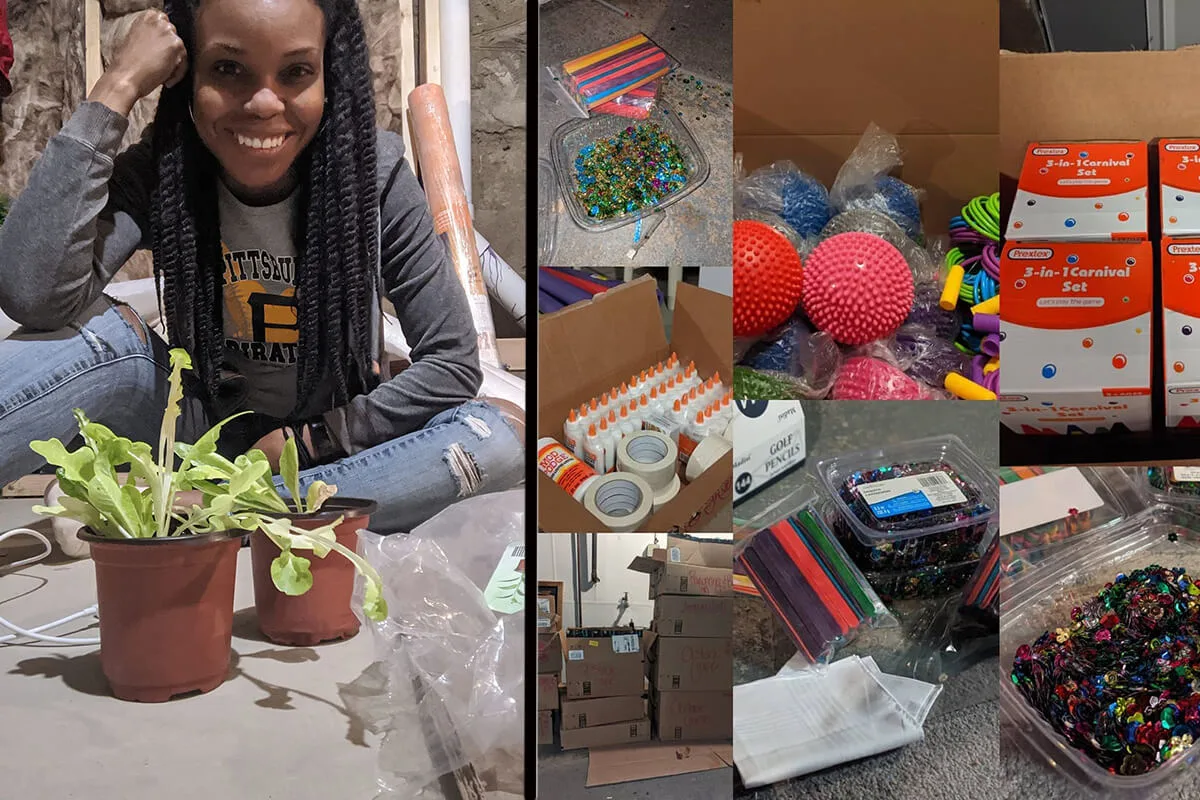
Images courtesy of Tiffany Ward
“Education is more than a job for me, it’s about activism.”
When the pandemic hit, Tiffany Ward, a Pittsburgh-based educator with nearly a decade of experience, felt a deeper calling to serve students.
“Education is more than a job for me; it’s about activism,” she explained in an interview with The Keystone. “I’d been feeling a push to ‘start something’ in education for the longest, but I just didn’t know what that would look like, or how to do it.”
That something is now the Pittsburgh Village Project, a community-organized educational initiative that engages students through creativity and academics to combat learning loss, which educators define learning loss as a general loss of knowledge or academic progress, most commonly due to extended gaps or discontinuities in a student’s education.
“Knowing that this pandemic would cause significant amounts of learning loss—inequitably in communities of color, and communities with less access to technological resources—I felt a sense of urgency to begin something right away to supplement the hard work schools were already doing,” said Ward, who works as a math instructional coach at Pittsburgh Public Schools during the school year.
Sudden school closures resulting from the COVID-19 pandemic thrust school districts throughout the country into an abrupt distance-learning frenzy. As the end of the summer draws near, many Pennsylvania schools have yet to publicize learning decisions for the 2020-21 school year. As a result, educators, parents, and others have been left wondering how deep the gap in education will span.
Current research suggests that by fall, most students will have fallen behind where they would have been had they continued with in-classroom instruction. Some students could lose the equivalent of a full school year’s worth of academic gains, according to a working paper published by Annenberg Brown University. Education achievement gaps will vary depending on racial and socioeconomic disparities, internet access, technology access, and instruction from teachers.
The debate over whether schools can safely reopen is ongoing. President Donald Trump, Education Secretary Betsy DeVos, and now the CDC are aggressively pushing to reopen schools—but have failed to provide clear, federal guidelines on how to do so safely. Teachers, school staff, parents, and health officials, meanwhile, have been vocal about the lack of federal guidance on this critical issue, as well as the tens of billions of dollars needed to ensure proper social distancing, disinfecting, and preventative measures are put in place throughout the school year.
Engaging Kids Through Discovery and Exploration
Ward said her mother, an art teacher for elementary school children, is the inspiration for creating the Pittsburgh Village Project. In the early days of the pandemic, her mom would supply art kits to local neighborhoods to help children and their parents keep the creativity flowing.
The Pittsburgh Village Project uses kit-based instruction as a model for providing home resources and activities. Ward, who comes up with the concept and design of the kits herself, helps distribute them along with staff at Allegheny Center Alliance Church and Urban Impact Foundation in the North Side of Pittsburgh. Each kit is geared toward K-8 learning standards, but meant to be inclusive.
“The driving force behind the project is to keep students engaged with discovery and exploration through these kits, to ensure that opportunity gaps don’t continue to harm students,” Ward explained. “I want students to ask questions, design new things, gain independence and innovatively solve problems, and, more than anything, to just have fun.”
The summer kit has a gardening theme, which offers students a chance to learn science, math, and engineering skills through seed starter kits and plants and corresponding, customized activities. Plants for the kits were donated by Phipps Conservatory and Grow Pittsburgh, and each kit was distributed through staff at Allegheny Center Alliance Church and Urban Impact Foundation at the beginning of summer.
“Students can learn so much from one plant,” Ward said. “Gardening helps students practice independence and responsibility, and with continued interest, could provide opportunities for community sustainability through urban gardening.”
While more themed kits for the upcoming school year are in the works, the Allegheny Center Alliance Church, Urban Impact Foundation, and The Pittsburgh Project have been holding virtual programs for students in Pittsburgh’s North Side this summer. The virtual “camp” experiences offer students opportunities to learn through play, engineering, and design challenges. Student activities include creating an obstacle course via the Safe Play Challenge, DIY masks, home gardening, scriptwriting, bridge building, and designing inventions to address a neighborhood area of need.
As for the upcoming school year, The Pittsburgh Village Project plans to go full steam ahead with programming. Earlier this month, Pittsburgh Public Schools released the plan for the 2020-21 school year, consisting of three options: full-time online by choice, a mix of in-person and online classes, or full-time online learning for all.
Full-time online classes would have students learning during their scheduled class time and having library, related arts, and electives occur on their regularly assigned days. The district says 700 students have already enrolled in full-time e-learning.
Since so many students will be participating in online learning this year—partially and full-time—Ward called mapping out future plans “a welcome challenge,” but one that comes with plenty of vision. Her goal, she said, is to develop “unique educational resources for children, regardless of race or socioeconomic status.”
“My dream is for it to be a desegregated experience since so many students in the area already attend schools that lack diversity in many aspects,” she said. “It will be truly powerful if children are given time to collaborate and innovate across races and socioeconomic groups, as it should be.”
One Piece of the Puzzle to Fighting Systemic Racism
With so many unknowns about students returning to school in general, Ward knows personalized instruction is tantamount to their success. She plans to work with parents and their children in creating new, themed learning kits and resources that would best serve their individual needs—in addition to teaching students full-time.
With ever-changing directives on a state and educational level, the Pittsburgh Village Project is still working out logistics for fall and the best way to reach its demographic. “What I do know is that parents want to be involved, and more opportunities should be given for them to share their voices, so it is top priority for me to connect with families and determine what instruction and assessment will help accelerate student learning the most,” Ward said. “I’m working on determining a target audience for next year, times to work with them, and developing a team of passionate people who have similar goals for children around the city.”
Equity in education is, after all, the cornerstone of the Pittsburgh Village Project. Children of color are disproportionately affected by opportunity gaps—or the arbitrary circumstances in which people are born that determine their opportunities in life, such as race or ZIP code— particularly amid the pandemic.
“What’s important in designing a diverse experience, however, is that all of the children are equitably heard, valued, and given the tools to combat social injustices,” Ward said. She hopes to achieve this through the work of the Pittsburgh Village Project. “Education is the most powerful way, in my opinion, to fight systemic racism. We, as educators—and the community at large—must be willing to do the work.”
Politics

How Project 2025 aims to ban abortion in Pennsylvania
Former president Donald Trump said abortion was a state’s rights issue recently, but conservative organizations, under the banner “Project 2025,”...

736,000 PA households could lose crucial help on their internet bills
Time is running out for the Affordable Connectivity Program, which provides low-cost high speed internet access for over 736,000 Pennsylvania...

What to know about Trump’s legal issues
Over the past year, former president Donald Trump has become the center of not one, not two, not three, but four criminal investigations, at both...
Local News

Conjoined twins from Berks County die at age 62
Conjoined twins Lori and George Schappell, who pursued separate careers, interests and relationships during lives that defied medical expectations,...

Railroad agrees to $600 million settlement for fiery Ohio derailment, residents fear it’s not enough
Norfolk Southern has agreed to pay $600 million in a class-action lawsuit settlement for a fiery train derailment in February 2023 in eastern Ohio,...





